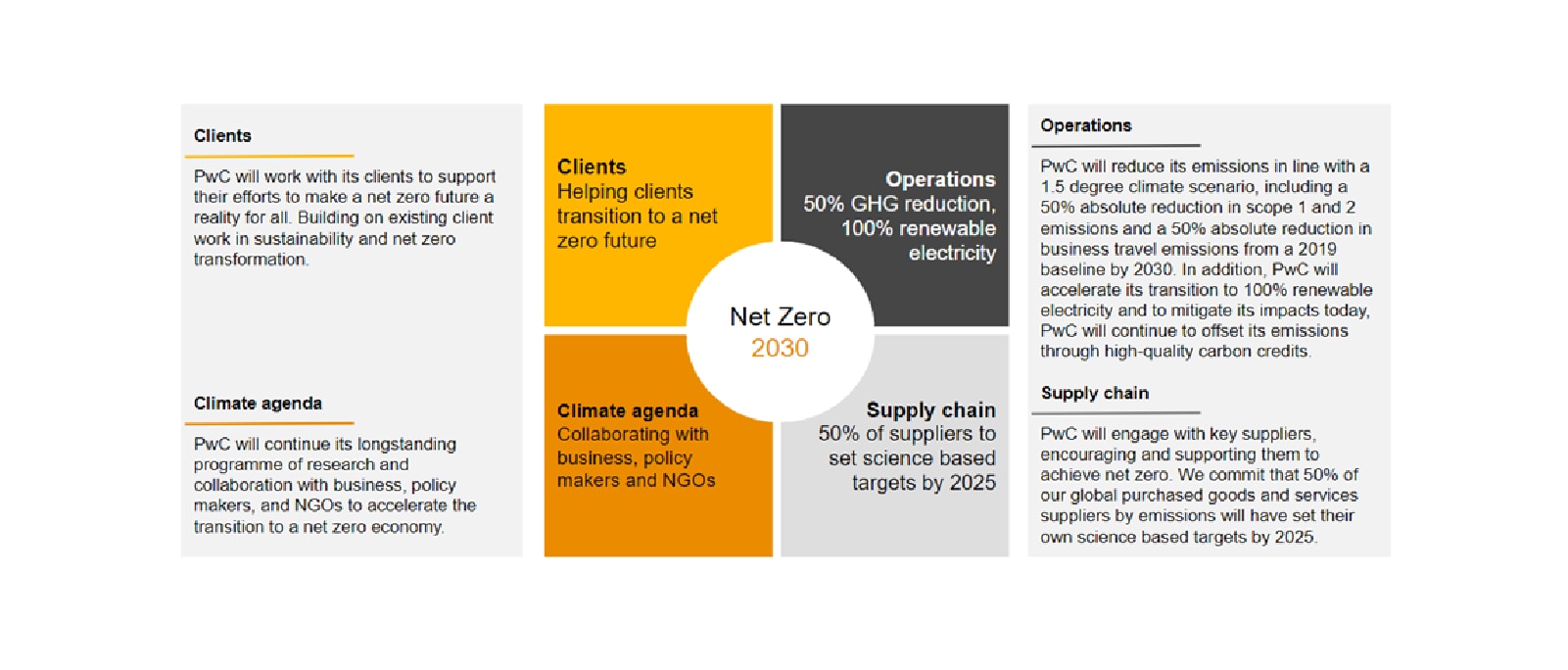The science is clear: to avoid the worst impacts of climate change, businesses, governments and society need to work together to transition to a net zero economy by 2050.
Malta’s natural environment has long faced various challenges, from widespread construction and natural resource exploitation to littering, environmental degradation and unsustainable waste management. In the face of these challenges, it is our view that businesses need to not just evolve but take up their responsibility and act to create a sustainable world fit for future generations.
“Businesses have the responsibility of being a force for good. This is not just important for companies to maintain a social licence to operate, but also crucial for the upkeep of the healthy societies we live in.”
At PwC, we are working to decarbonise our business and adapt to the impacts of climate change. This means setting clear targets, creating practical plans that achieve real results, and collaborating with other organisations in the broader ecosystem to support the net zero transition.
In line with our purpose, we have made a worldwide science-based commitment to reach net zero greenhouse gas emissions by 2030.


The New Equation
During the past year, we’ve brought our global strategy The New Equation to life and delivered on our purpose using the skills and energy of our community of solvers to tackle arguably the most important challenge of our time - climate change.
We’ve been working across three main pillars:
Transitioning our own business, sharing our own experience with other businesses and organisations;
Supporting our clients in their transition to a low-carbon world; and
Engaging in the global climate policy debate and advocating for change – including our focus on reporting and transparency frameworks.
PwC Malta’s Net Zero commitment
Over the past year, we’ve drawn up a local net zero action plan detailing key actions taken, progress to date, challenges which remain and our emissions projection to 2030. We’ve already reduced our Scope 2 emissions by 29% and our total emissions by 17% compared to our FY19 baseline.
- Scope 1 & 2 emissions
- Scope 3 emissions
- Paper consumption initiatives
- Water consumption initiatives
- Other initiatives
Scope 1 & 2 emissions

Given the nature of our business, while we don’t have any Scope 1 emissions, our Scope 2 emissions from electricity and heating make up a big portion of our carbon footprint, accounting for 53% in 2019.
Since then, we’ve managed to reduce our energy use through various initiatives including the instalment of energy-efficient air conditioning and lighting, a new building management system and infrared films on all windows to reduce heat loss. We have also managed to generate our own renewable energy from a PV system installed on the roof of PwC’s carpark.
Scope 3 emissions

Looking back on our baseline, our Scope 3 business travel emissions accounted for 47% of our total footprint in our 2019 fiscal year (FY19), with air travel being the greatest contributor. Reducing our absolute business travel emissions by 50% is, therefore, a key focus to reach net zero, particularly since an absolute target means that we’ll need to reduce our emissions even as our business grows.
Reducing our Scope 3 emissions may therefore prove more challenging, particularly given the dependence on air travel as an island in the Mediterranean. The COVID-19 pandemic led to a dramatic reduction in travel emissions over FY20 and FY21, however, we’ve since experienced a substantial bounce back in travel emissions following the return to work. In this respect, we need to look back and learn from the pandemic and see how we can continue to evolve our operating models and the way we deliver services to our clients.
To counterbalance emissions we have not yet reduced, we’ve committed to purchasing high-quality carbon credits in the voluntary carbon market.
Starting from the next financial year (FY23) we’ll offset energy and mobility emissions (Scope 1, 2 and 3 business travel) and in FY30, we will then transition our portfolio to carbon removals. In this respect, the PwC network runs a global carbon credit purchase process for all member firms, including PwC Malta. This offers a range of credits in terms of project type and location.
Paper consumption initiatives
We are aware that a considerable portion of our waste relates to paper and the habit of printing in the nature of our work. To facilitate a culture of restricted printing, we have provided our employees with a second monitor in a bid to reduce the need to print documents. We also strongly encourage staff to use electronic documents rather than printed ones.
We have noted an increase of 26% in our paper consumption compared to the prior year. This can be attributed to the fact that we have been accommodating more people in our office compared to last year given the relaxed COVID-19-related restrictions. We do note a decrease in our paper consumption as compared to prior years without or with minimal COVID-19 restrictions (namely the years ending June 2020 and June 2019).

Water consumption initiatives
Water is a scarce resource for Malta, and we aim to limit our waste of water to a strict minimum. Following a water audit that PwC undertook in 2021, flow restrictors and pressure pumps were installed throughout the office. We have also installed aerators in the bathrooms to further reduce our water consumption.
Previously we were using both first-class water and grey water. In July 2022, we made the switch to first-class water only, ceasing the use of grey water. The grey water was damaging our pumps and water cisterns due to the high level of impurities and we had limited control over the delivery of the grey water. The switch to first-class water enabled us to have a better measure of our water consumption.

Other initiatives
In December 2021, we contributed to environmentally oriented activities in collaboration with organisations including BirdLife and Majjistral Park. Nine of our people contributed several hours to these environment-friendly activities. We worked with BirdLife to weed tree saplings and clean up at Salina Nature Reserve. We also made donations to Majjistral Park and are planning upcoming activities where our people will contribute to cleaning up the Park.


Moreover, we switched a portion of our lighting to LED lighting to reduce our electricity consumption. We have an ongoing project to replace all of the lighting in our offices to LED lighting.
We have also introduced more plants in our office to make our workplace greener and to increase the workplace satisfaction of our employees.
Following the expansion of our offices, we further plan to replace the older A/C units (legacy from the previous lessee) with more modern, energy efficient models. The additional A/C units will subsequently be added to our centralised A/C controller to better manage our consumption.
Contact us














